Catedral Basílica Metropolitana de la Inmaculada Concepción de María (Metropolitan Cathedral of Medellín) is the main church of the Archdiocese of Medellín and is the largest church in the city.
Furthermore, it’s considered the most important church in the city, as it’s the seat of the Archbishop of Medellín. In addition, the church is considered a tourist attraction in the city.
This Roman Catholic church is reportedly the largest brick cathedral in the world. And it’s supposedly the largest church in South America. About 1,120,000 adobe bricks were used in the construction of the church. This neo-Romanesque style church is located in El Centro, directly north of Parque Bolívar.
Catedral Basílica Metropolitana is impressive to see. And it could potentially be added to our recommended tourist itinerary for a day in Medellín.
In addition, we included Catedral Basílica Metropolitana in our list of the top 14 churches in Medellín and the Aburrá Valley.
In 1948, Pope Pius XII granted the liturgical title of Basilica Minor to the church. Most noteworthy, Catedral Basílica Metropolitana was named a National Monument of Colombia in 1982.
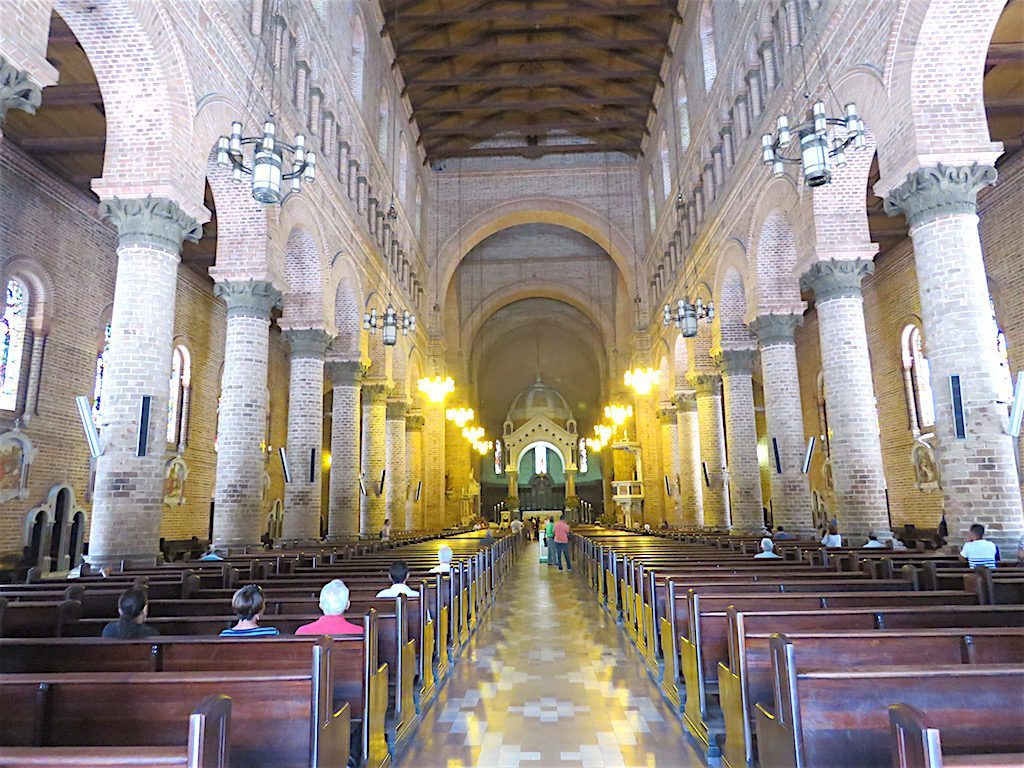
The central nave inside the church
History of Catedral Basílica Metropolitana
When Valerio Antonio Jiménez became the bishop of Medellín in 1868, he insisted on construction of a new church in the city. This was due to the Iglesia de La Candelaria church being used by the Diocese at the time was considered too small.
The land that Catedral Basílica Metropolitana was built on was donated by English engineer and philanthropist Tyrrel Moore. And directly south of the land where the church was built is Plaza de Villanueva, which was additional land donated to the city by Moore and was renamed as Parque Bolívar.
Construction of the church started in 1875. But construction was suspended because of the civil war in Colombia from 1876 to 1877. In 1982, construction resumed but was suspended again due to claims of incompetence of the initial architect, Felipe Crosti.
Under Bishop Bernardo Herrera Restrepo, a second phase of the church construction started in 1886. Also, the previous design was discredited. So, French architect Carlos Carré developed a new design.
Carré continued his work until June 1894, leaving much of the central arches and the plans with sufficient guidelines to the builders to use to finish the building. Carré was replaced by Heliodoro Ochoa and Salvador Ortiz, who were linked to the work until they died in 1916 and 1919, respectively.
In 1902, the Diocese of Medellín was elevated by Pope Leo XIII to the category of Archdiocese. Archbishop Manuel José Caycedo arrived in 1906 and was linked to completing construction of Catedral Basílica Metropolitana.
Finally, the principal construction of the church was completed in 1917. And the first mass was held in the church that year. There was additional construction work in the church later to add the altar, pulpit and other ornamental works plus make other changes to the church.
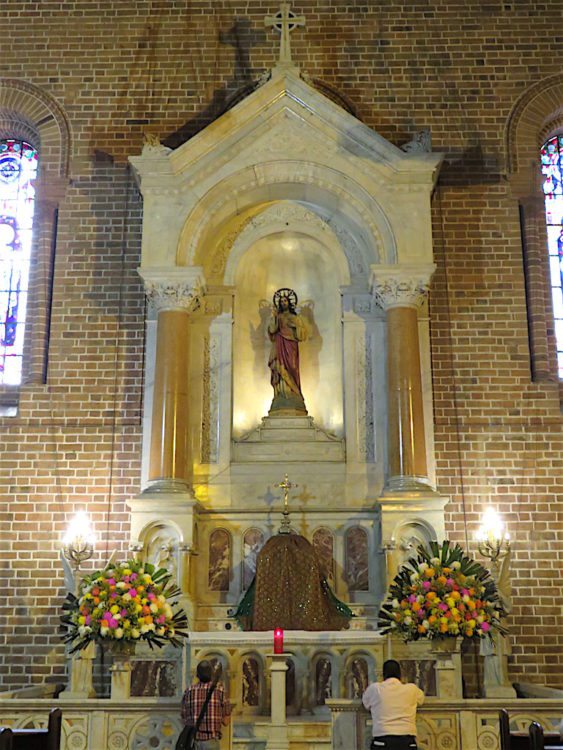
Altarpiece of the Tabernacle and of the Heart of Jesus, located on the east side of the church
Inside Catedral Basílica Metropolitana
The interior of Catedral Basílica Metropolitana is brick with many columns. And the church has many works of art, including paintings and sculptures by renowned artists.

The 1932 German organ in Catedral Basílica Metropolitana
The organ in the church was built by E.F. Walcker & Cie. in Germany in 1932 at a cost of $25,000. The organ was shipped by boat to Colombia and it traveled up the Magdalena River to Puerto Berrio. From there it was shipped to Medellín on the Antioquia railroad. And it was installed in the church in 1933.

Confessionals in Catedral Basílica Metropolitana
The church has a total 12 confessionals located along the two sides of the church. And each confessional consists of a center portion for the priest and two sides for the penitents.
In addition, the church has a small religious museum consisting of four rooms, which is located in a room next to the basilica. I asked to see this small museum in the church. But unfortunately, it’s not open to the public.
The art collection in the church museum reportedly includes about 40 paintings (from the 17th, 18th and 19th centuries) and 15 sculptures (between the 18th and 19th centuries).
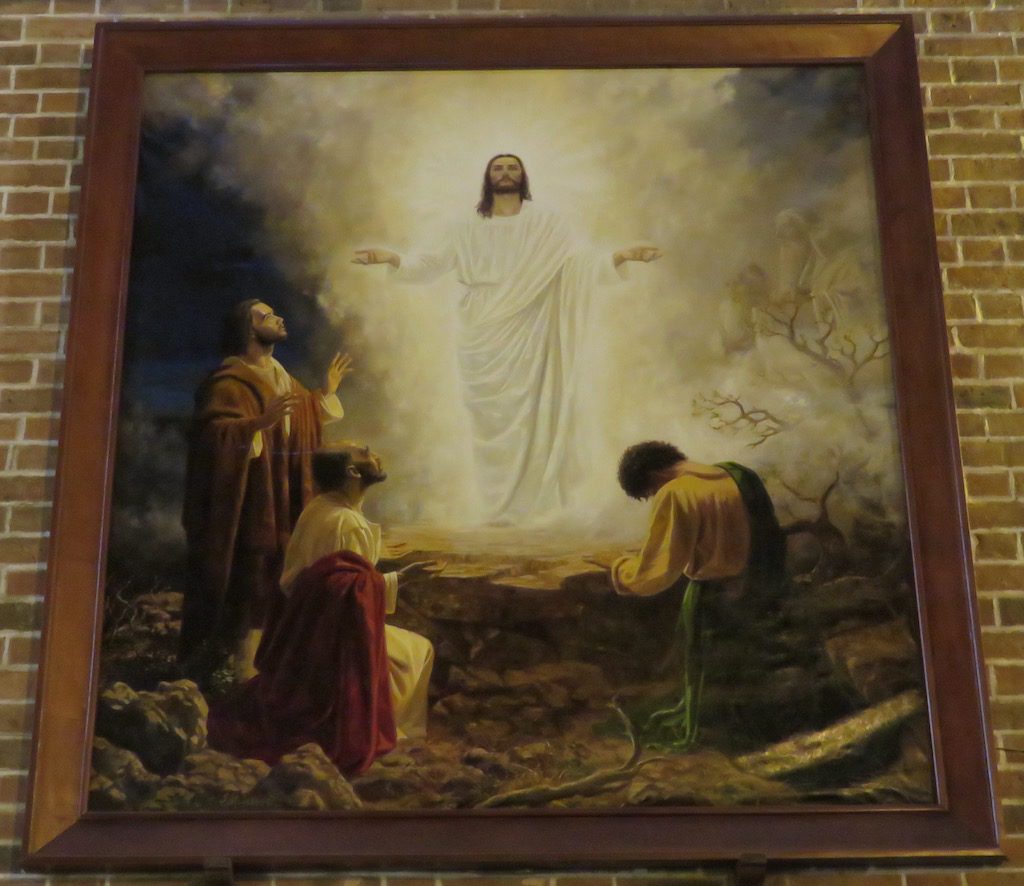
One of the paintings in the church
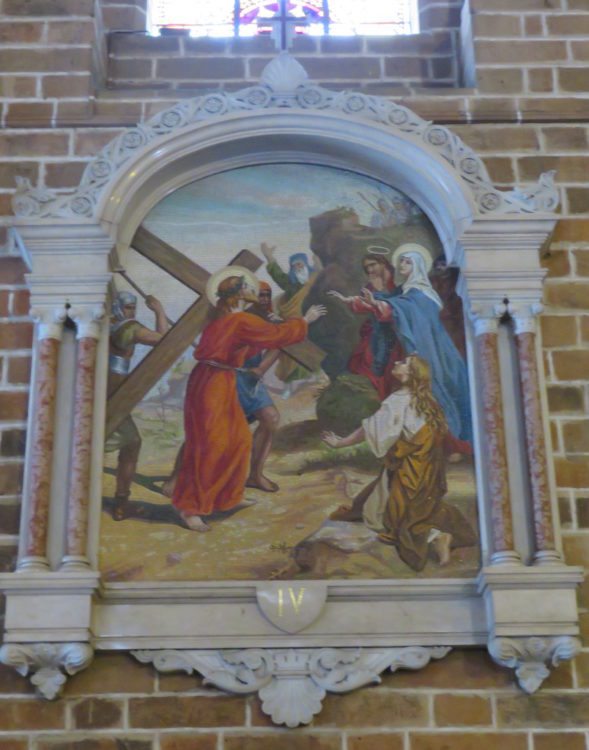
One of the many art pieces in the church
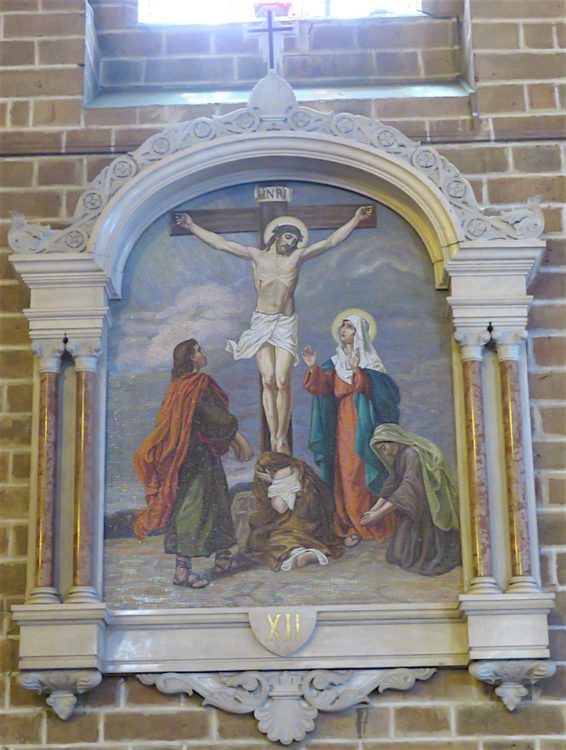
Another of the many art pieces in the church

Stained-glass window in Catedral Basílica Metropolitana

Another stained-glass window in Catedral Basílica Metropolitana
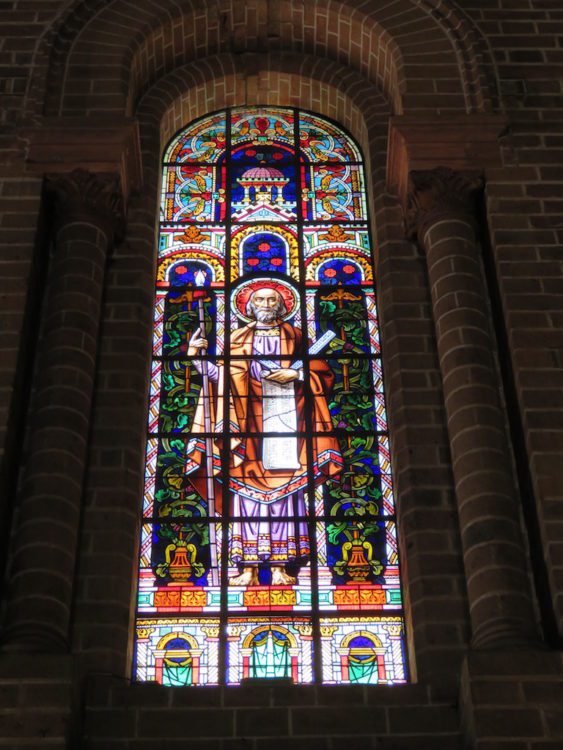
Another stained-glass window in Catedral Basílica Metropolitana
Stained Glass Windows in Catedral Basílica Metropolitana
The impressive stained-glass windows in the church were designed by Giovanni Buscaglione. In addition, the stained-glass windows were built by the French House Artistic Stained Glass of Maumejean brothers, in their workshops of Spain. The total original cost was $25,608.
In the church, there is a total of 76 stained-glass windows. Also, the stained-glass windows are in various sizes with different figures and drawings. The windows originally arrived in Medellin in 1921.

The greater altar in Catedral Basílica Metropolitana
Renovation of Catedral Basílica Metropolitana
In 2009, the organ in the church was renovated at a cost of 630 million pesos with the German government contributing 70,000 Euros, as the organ is one of the few German organs built before World War II that is still preserved. The city of Medellín and the Government in Antioquia as well as private companies all contributed to the renovation that was completed in 2010.
Reportedly Catedral Basílica Metropolitana needs more renovation work done based on a study done several years ago, which assessed the condition of the building.
The cathedral has some structural deficiencies, settlements, cracks, moisture and deterioration of brick. This is to be expected of a large brick building this old. But fortunately, nothing is critically wrong with the building.

Simón Bolívar stature in Parque Bolívar
Parque Bolívar
Catedral Basílica Metropolitana is located directly north of Parque Bolívar in the in the Villanueva barrio of La Cendelaria (El Centro). The park occupies two city blocks.
Parque Bolívar is named in honor of the liberator Simón Bolívar. In 1923 an equestrian statue was erected in the park, which was designed by the Italian sculptor Giovanni Anderlini and was cast by the Italian sculptor Eugenio Maccagnanai.
In the park, you will typically see many vendors. Also, open-air concerts are held in this park the first three Sundays of each month at 11:15 am. In addition, there is a crafts fair on the first Saturday of each month in the park.
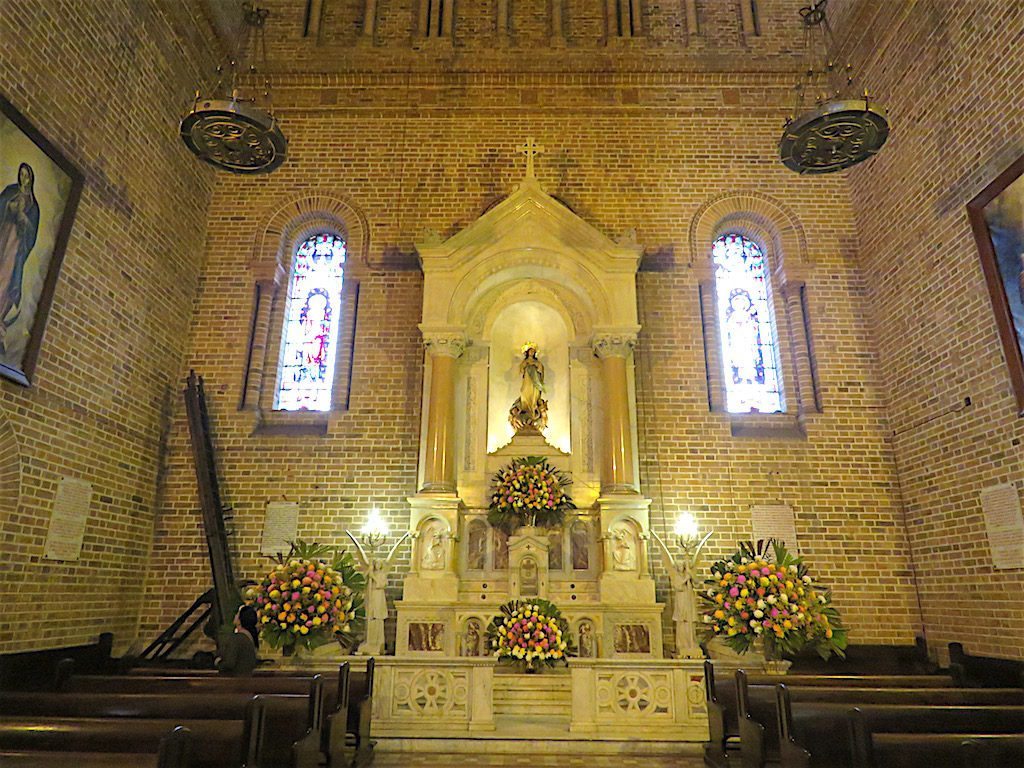
Altarpiece located on the west side of Catedral Basílica Metropolitana

Santa Maria de la Paz (Santa Maria of the peace) in Catedral Basílica Metropolitana
How to Get to Catedral Basílica Metropolitana
The church is located about an 8 to 10-minute walk from Museo de Antioquia. Also, the church is located about four blocks from the Prado metro station. But the route from the Prado metro station seems like it has fewer pedestrians and is more of a sketchy neighborhood. So, it’s not recommended, particularly after dark.
Also, all the taxi drivers in the city will know where Catedral Basílica Metropolitana is located.
This church is normally open in the mornings, as masses are held hourly in the morning. In addition, it closes in the afternoon. And it opens again for the last mass of the day, which is at 6 pm daily and also at 7 pm on Sundays.
Address: Carrera 48 #56-81, El Centro
Phone: +57 4 513 2269
Email: lacatedral@arqmedellin.co
Hours: Mass schedule: Monday to Friday: 7 am, 8 am, 9 am, 10 am, 6 pm; Saturday: 7 am, 8 am, 9 am, 10 am, 11 am, noon, 6 pm; Sunday and Holidays: 7 am, 8 am, 9 am, 10 am, 11 am, Noon, 6 pm, 7 pm
The Beautiful Churches in Medellín and the Aburrá Valley
In the metropolitan Medellín metro area (Aburrá Valley), there are over 300 Roman Catholic churches. Most notably, there is a complete list of all the churches of the Archdiocese of Medellín.
We have looked at a total of 33 beautiful churches in the Medellín metro area and the Aburrá Valley in a series on this website. And 22 of the churches we have looked at in detail are in Medellín:
- Catedral Basílica Metropolitana – the main church of the Archdiocese of Medellín and the largest church in the city.
- Iglesia de La Candelaria – the oldest church in Medellín, which is also a National Monument of Colombia.
- Iglesia San Antonio and Plaza San Antonio – the church with the largest dome in Medellín located next to Plaza San Antonio with four Fernando Botero sculptures.
- Iglesia Jesús Nazareno – another of the most beautiful churches in Medellín.
- Iglesia Nuestra Señora del Perpetuo Socorro – a beautiful Gothic-style church in Medellín.
- Iglesia del Sagrado Corazón de Jesús – a neo-Gothic-style church located in Barrio Triste in Medellín.
- Iglesia de San José – a Boroque-style church located in El Centro, Medellín.
- Iglesia del Señor de las Misericordias – a neo-Gothic-style church located in the Manrique neighborhood of Medellín.
- Iglesia San José – a Romanesque-style church located next to Parque Poblado in El Poblado.
- Iglesia de la Veracruz – a colonial church with a history that goes back to 1682, which makes it one of the oldest churches in Medellín.
- Iglesia de San Ignacio – a beautiful church in El Centro with a Baroque-style exterior and colonial interior.
- Iglesia de Nuestra Señora – a Roman-style church located next to Parque Belén in Medellín.
- Iglesia el Calvario – a Romanesque-style church in the Aranjuez comuna in Medellín.
- Iglesia de Nuestra Señora del Sufragio – a neo-Romanesque-style church in the Boston barrio in Medellín.
- Iglesia de San Benito – a neo-Romanesque-style church with a history that traces back to 1678, which make it one of the oldest churches in Medellín.
- Iglesia de Nuestra Señora de los Dolores – a Neo-Byzantine-style church in the La América comuna in Medellín.
- Iglesia de Nuestra Señora del Sagrado Corazón – a beautiful Neo-Gothic-style church in the Buenos Aires comuna in Medellín.
- Iglesia de Cristo Rey – a beautiful church in the Guayabal comuna of Medellín with many beautiful stained-glass windows.
- Iglesia de Nuestra Señora de los Dolores – a beautiful Neoclassical-style church in the Robledo comuna of Medellín, which is also a National Monument of Colombia.
- Iglesia del Cementerio San Pedro – a beautiful church built in 1929 that has some of the most beautiful stained-glass windows found in the churches in Medellín.
- Iglesia de El Niño Jesús de Praga – a beautiful church in the Villa Hermosa comuna in Medellín.
- Iglesia San Joaquín – a beautiful church in the Laureles-Estadio comuna in Medellín that is reportedly the second largest church in Medellín.
Also, we have looked at the principal church in each of the other nine municipalities in the Aburrá Valley:
- Iglesia de Santa Gertrudis – a beautiful church in Envigado located next to Parque Envigado.
- Iglesia Nuestra Señora del Rosario – a church located in Bello that is arguably the most beautiful church in the Aburrá Valley
- Iglesia de Santa Ana – a very popular church in Sabaneta located next to Parque Sabaneta.
- Iglesia de Nuestra Señora del Rosario – a historic church in Itagüí near Medellín with a history that traces back to 1743.
- Nuestra Señora Chiquinquirá – a beautiful church in La Estrella with a Neo-Gothic-style.
- Catedral Nuestra Señora de las Mercedes – a Neoclassical-style church with a history that traces back to 1793 and is located in the Caldas municipality south of Medellín.
- Iglesia de Nuestra Señora de la Asunción – a Baroque-style church with a history that traces back to 1715 and is located in the Copacabana municipality north of Medellín.
- Catedral de Nuestra Señora del Rosario – a Neo-Romanesque-style church located in the Girardota municipality northeast of Medellín.
- Iglesia de San Antonio de Padua – a Neo-Romanesque-style church located in the Barbosa municipality northeast of Medellín.
Also, we looked at two smaller colonial-style churches while looking in detail at two nearby larger churches:
- Hato Viejo Chapel – a colonial-style church in Bello built between 1772 and 1796. It’s also a National Monument of Colombia. We looked at Hato Viejo Chapel while covering Nuestra Señora del Rosario.
- Capilla de María Auxiliadora – a colonial-style church in Barbosa built between 1773 and 1776. We looked at Capilla de María Auxiliadora while covering Iglesia de San Antonio de Padua.
In addition, we looked at Las Lajas Sanctuary located in Ipiales, Colombia, which is considered the most beautiful church in Colombia. Also, it’s considered by many to be one of the most beautiful churches in the world.
The Bottom Line: Catedral Basílica Metropolitana
Catedral Basílica Metropolitana is one of the few churches found in the 10 English language Colombia travel guidebooks that I have. It’s worth stopping to see this notable Roman Catholic church if you like old churches.
Several of the most notable and beautiful churches in Medellín are located in El Centro like this church. But we have also been looking at notable and beautiful churches in other neighborhoods in the Medellín metropolitan area.
Seems like, in my experience, that most of the travel guidebooks in English about Colombia are missing many of the best places in the cities and pueblos in Colombia.
Consequently, we have covered the beautiful churches in the Medellín metro area in a comprehensive series on this website. Most noteworthy, we did this since a majority of the beautiful and notable churches in the city are missing from the English-language travel guidebooks about Colombia.
Sign up for the Free Medellin Guru Newsletter – You can see all of the previous Medellin Guru weekly email newsletters and sign up here.

